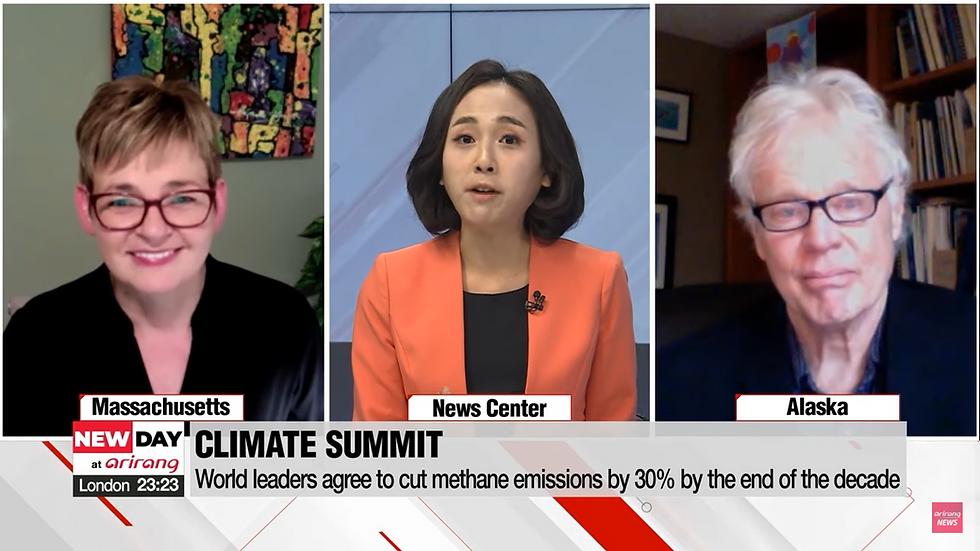Arirang News Interview: Did world leaders at COP26 fail to fight climate change?
- Elen Paronyan
- Nov 1, 2021
- 3 min read

As the world leaders engage in negotiations on tackling climate change, the world watches the 26th session of the Conference of the Parties (COP 26) to the UNFCCC (United Nations Framework Convention on Climate Change) while holding breath with rapt attention. Many questions swirl about the outcomes of COP26. Center Director, Maria Ivanova discussed this global matter in an interview with Arirang News on November 2nd.
Professor Maria Ivanova gave an interview to Arirang TV in South Korea tonight; it is the CNN equivalent in English there. Dr. Ivanova, the director of the Center of Governance and Sustainability at UMass Boston, and the author of the “The Untold Story of the World's Leading Environmental Institution UNEP at Fifty," as well as Rick Steiner, a professor of marine conservation at the University of Alaska, and the founder/director of "Oasis Earth: Environmental Sustainability Consulting" were the experts at the “Global Insight” of the Arirang News. The interview focused on the world leaders’ meeting and pledges at the COP26 Summit in Glasgow. The experts discussed whether the “world leaders at COP26 failed to fight climate change.” The first major decision made at the COP26 Summit, by 110 national governments and 30 large financial firms was signing a pledge to end deforestation by 2030. Professor Ivanova opened with the significance of the pledges made, and followed with the concern about national accountability.
“The question is, will it be implemented? We have to be optimistic but we also have to keep our eyes open and shout as necessary."
Prof. Ivanova reminded that there was a similar agreement made in 2014 -- the New York Declaration on Forests, where 37 countries agreed to half deforestation by 2020 and end it by 2030. “We are now 2021, we have not halved deforestation.”
Dr. Ivanova thinks that the new agreement is significant since there are more actors who made this pledge, especially key countries like Brazil, China, and Russia that did not sign during the 2014 Summit. Moreover, she mentioned that there is more funding, and more ambition since the new aim is not only ending deforestation, but also reversing it by 2030; this was not part of the previous agreement. She addressed what still needs to be done to keep the 1.5°C Paris target/pledge. Prof. Ivanova spoke about building awareness and changing our consumption habits/the capitalist system that transformed us from “citizens into consumers.”
“We have to bring together the power of citizens and the power of consumers to shift the economic paradigms that actually lead to the path on which we currently are on."
Maria Ivanova explained if and how diplomatic pressure can persuade biggest polluters, such as China, Russia, India, to improve their climate targets, such as the one to become carbon-neutral only by 2060 and 2070. Furthermore, she explained President Biden’s controversial politics, that is rejoining the Paris Climate Agreement, emphasizing carbon neutrality in his speeches, but also issuing 2,500 new oil and gas permits only 11 months in office, as a result of the pre-existing permits that were left from the Trump administration.
"To lead by example, the United States has to do just that: set an example. And it has not done that. It has to create new rules and new regulations at home, so it gets to the root causes of the problems, not just symptoms. We need a different regulatory and legal system that actually bans pollution that is not paid for.”
Ivanova also compared the success of the Montreal Protocol in solving the depletion of the ozone layer, to the potential success of COP26, with reference to the role of the UNEP, United States, and the private sector.
“We have done this before. If there is one global environmental problem that we have solved it is the depletion of the ozone layer... we have seen this before, it has worked, and I think we should implement the lessons from the global environmental governance rulebook that we have today.”

Comments